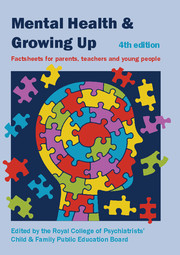Book contents
- Frontmatter
- Contents
- Contributors
- Factsheets for young people
- 1 Bipolar disorder
- 2 Cannabis and mental health
- 3 Cognitive–behavioural therapy (CBT)
- 4 Coping with stress
- 5 Depression
- 6 Drugs and alcohol
- 7 Exercise and mental health
- 8 Mental illness in a parent
- 9 Obsessive–compulsive disorder (OCD)
- 10 Psychosis
- 11 Schizophrenia
- 12 When bad things happen – overcoming adversity and developing resilience
- 13 Worries about weight and eating problems
- 14 Worries and anxieties
- 15 Who's who in child and adolescent mental health services (CAMHS)
- Factsheets for parents, carers and anyone who works with young people
8 - Mental illness in a parent
from Factsheets for young people
Published online by Cambridge University Press: 02 January 2018
- Frontmatter
- Contents
- Contributors
- Factsheets for young people
- 1 Bipolar disorder
- 2 Cannabis and mental health
- 3 Cognitive–behavioural therapy (CBT)
- 4 Coping with stress
- 5 Depression
- 6 Drugs and alcohol
- 7 Exercise and mental health
- 8 Mental illness in a parent
- 9 Obsessive–compulsive disorder (OCD)
- 10 Psychosis
- 11 Schizophrenia
- 12 When bad things happen – overcoming adversity and developing resilience
- 13 Worries about weight and eating problems
- 14 Worries and anxieties
- 15 Who's who in child and adolescent mental health services (CAMHS)
- Factsheets for parents, carers and anyone who works with young people
Summary
Why is it difficult when a parent has a mental illness?
Illness in someone you live with, especially a parent, is always difficult because the person who is there to look after you suddenly can't do it. Instead you may have to be the ‘carer’, which means you are the one who does the looking after.
With any illness everyday activities can be very difficult, but when a parent has a mental illness everything can be even more confusing because:
• your parent(s) may not look ill or stay in bed, but they might just behave and be different
• they may think and feel differently about things than they did before or compared with how other people think and feel.
When your parent is unwell, it can start affecting your everyday life, like having meals or going to school. Many children start thinking and blaming themselves for perhaps doing something wrong, worrying unnecessarily that they may have been naughty and somehow caused the illness. These thoughts are quite common among children and young people in these difficult situations – but of course these worries are not true.
What are the different types of mental illness?
There are various types of mental illness and various terms are used to describe them. Below we mention a few. Remember, every illness is different and it can affect people in different ways.
• When a person has depression they appear sad and/or tearful. They don't seem to enjoy anything, and find that they can't sleep or eat properly. • When a person suffers from anxiety they may worry so much that they find it difficult to even go out. They may worry that bad things will happen.
• When a person has obsessive–compulsive disorder (commonly referred to as OCD), they can have worrying thoughts about keeping everything in order and having to do things in a very special way or performing ‘rituals’, such as repeatedly washing their hands or checking the doors.
• When a person has psychosis they may behave bizarrely, for example they may talk to themselves, talk of things which do not make sense or seem unusual. They may get annoyed if others try to reason with them and may not sleep or eat well.
- Type
- Chapter
- Information
- Mental Health and Growing UpFactsheets for Parents, Teachers and Young People, pp. 22 - 25Publisher: Royal College of PsychiatristsPrint publication year: 2013



